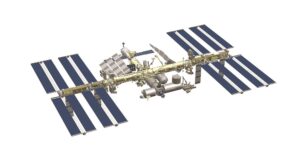Policymaking needs to catch up to the reality of “heavy traffic” in the space domain. Congress should start by transferring the authority to carry out critical nondefense space situational awareness (SSA) activities from the Department of Defense to the Department of Commerce.
Putting Commerce in charge of debris tracking and warning notifications for civil, commercial, and international space actors would better leverage the department’s expertise in handling data and interfacing with innovative commercial space businesses. At a time of rising military competition in space, transferring these authorities would also free up DoD to focus its limited resources on its national security mission.
“SPACE JUNK” IS A GROWING THREAT TO SPACE OPERATIONS
When the International Space Station welcomed its first crew members, 770 active satellites were orbiting the Earth. Today, the number of satellites has climbed to over 2,600. And that number will continue to increase as megaconstellations — hundreds or thousands of internet-providing commercial satellites — are launched into low Earth orbit.
The U.S. Space Force keeps track of thousands of satellites. It also tracks some 24,000 pieces of space debris that threaten our astronauts and the billions of dollars in commercial, military, and scientific satellites that are vital to U.S. national security and the global economy. The real amount of space debris is thought to be between 500,000 and 1 million pieces, as current sensor technology cannot detect smaller objects. Space debris can travel at more than 17,000 miles per hour, and even tiny pieces can inflict severe damage to spacecraft. For example, a softball-sized piece of debris carries the energy of 660 pounds of TNT — more than enough to destroy a satellite. In a recent hearing before the Senate Commerce Committee, which I chair, NASA Administrator Jim Bridenstine testified that the agency has had to maneuver the International Space Station three times this year to avoid potential collisions with space debris.
Even worse, collisions in space can create thousands of new free-floating particles. In 2007, China created an estimated 35,000 pieces of debris when it conducted an anti-satellite weapon test that destroyed a defunct weather satellite. In 2009, a collision between a commercial communications satellite and a derelict Russian military satellite created at least 1,000 pieces of orbital debris. Identifying, tracking, and avoiding this hazardous material will become more difficult as low Earth orbit becomes more congested and near-misses increase.
THE COMMERCE DEPARTMENT SHOULD HANDLE SPACE DEBRIS TRACKING & WARNING
Recognizing the need for a whole-of-government response to debris congestion, President Donald Trump signed Space Policy Directive-3 (SPD-3) in June 2018. This directive called for the Commerce Department to take responsibility for managing and providing SSA data to non-U. S. government operators. Better data will allow Commerce to provide more accurate conjunction alerts, which notify a satellite operator of potential close calls or collisions. A recent study conducted by the National Academy of Public Administration found Commerce to be the best-suited agency to provide civil SSA services given its expertise in handling large, complex data sets and interfacing with the commercial sector.
SPD-3 was a great first step, but legislation is needed to implement the vision and directives it laid out. I have introduced the Space Preservation and Conjunction Emergency Act, or SPACE Act, to accomplish these objectives. The bill would authorize the Commerce Department to provide a basic level of SSA services to civil, commercial, and international space operators in line with President Trump’s space policy.
Within the Commerce Department, the Office of Space Commerce is best situated to carry out the SPD-3 mandate. But this office carries limited clout inside the agency and operates on a shoestring budget. My bill would fix these problems by elevating the Office of Space Commerce to a Bureau of Space Commerce led by an assistant secretary, and would authorize an appropriate amount of funds to staff and execute the bureau’s mission.
ACT NOW TO PRESERVE SPACE INTO THE FUTURE
Preserving the use of space is an important priority for the entire world. The United States should lead the way by continuing to provide accurate and timely data and collision warnings, ensuring that every spacefaring nation and company has access to conjunction alerts and accurate data. Doing so would help promote responsible behavior in space and protect billions of dollars in U.S. and allied space assets.
The SPACE Act would be an important step forward in the effort to preserve low Earth orbit for spaceflight and the satellites our nation depends on. I hope my Senate colleagues will join me in this effort.
U.S. Sen. Roger Wicker is chairman of the U.S. Senate Committee on Commerce, Science and Transportation.
This article originally appeared in the Nov. 16, 2020 issue of SpaceNews magazine.



